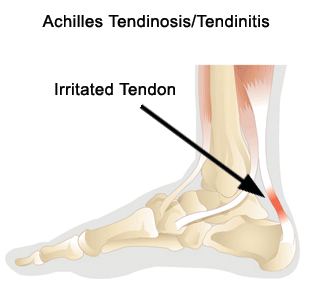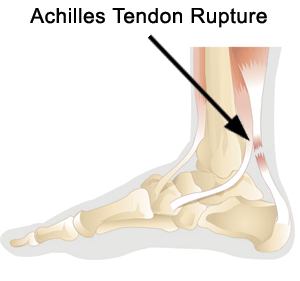Achilles Tendon Injuries
The Achilles tendon attaches the calf muscle (called the gastrocnemius and soleus muscles) to the heel. Excessive stress or a tight or fatigued calf muscle can result in microtrauma, degeneration, and even inflammation of the tendon- a condition called Achilles Tendonitis. It is typically caused by tightness in the hamstrings and calf muscles. In addition, limitations in ankle and foot range of motion can alter your walking pattern, putting excessive strain on the Achilles tendon, causing tendonitis. Prolonged walking, overtraining (excessive running or jumping, or walking hills can also cause this condition.
Typically, the back of the ankle and heel is very painful to touch, especially after prolonged walking. Rest tends to help Achilles tendonitis while walking aggravates it.§

Forceful contraction of the calf muscle may rupture (completely tear) the Achilles tendon. It occurs during jumping, running, and cutting and is often seen in basketball and baseball players or can happed with trauma, such as a motor vehicle accident. The patient often reports the sensation of having been hit or violently kicked in the lower calf. There is pain and a “divot” in the tendon above the heel. Surgery is required when this happens.

How physical therapy helps
Physical therapy is one of the best treatment options for Achilles tendonitis. Our physical therapists will evaluate your leg, ankle and foot mobility, range of motion, strength, balance and walking patterns. This will help us discover the root cause of your pain and resolve that for long term results.
We focus on treatments to resolve your pain quickly, improve your joint mobility and strengthen muscles as needed. The result is the ability to walk and run without pain in the back of your heel returning to the activities you love to do.
If surgery is needed for your recovery, rest assured that you are in the right hands for your rehabilitation. We work closely with your physician's rehabilitation protocols. The priority is to manage your pain and swelling after surgery, gradually increasing your range of motion in the knee per your post-surgery protocol. Rehabilitation may require six to twelve months of progressive care.
As time progresses, we work with you to gain your strength back in the ankle, improve stability of the joint, get you back to walking normally and eventually back into advanced movements including running.
Hours of Operation
Monday 7:00 - 5:00
Tuesday 7:00 - 12:00
Wednesday By Appointment Only
Thursday 7:00 - 5:00
Friday 7:00 - 12:00
Contact Us Today
570-726-0331
Allow us to help you "Achieve Your Goals"! Give us a call today to schedule an appointment!
Contact Info
© 2019 Chappell Physical Therapy. All rights reserved | Marketing by Mid-Atlantic Marketing Group